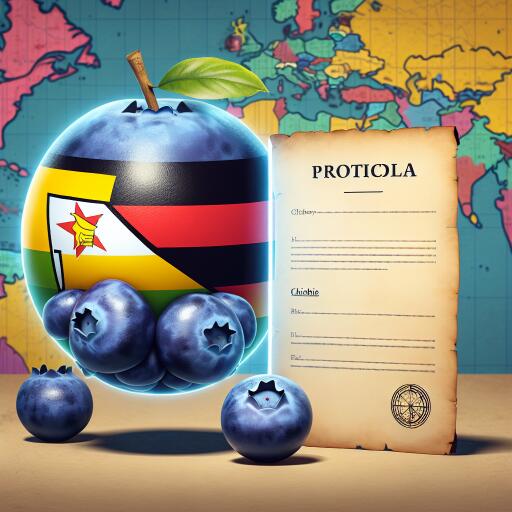Zimbabwe is in the process of expanding its trade agreements with China to include blueberries in the existing Zimbabwe/China citrus trade protocol. This strategic move is part of the country’s broader ambition to propel its horticulture industry to achieve a US$1 billion milestone by 2030.
The Horticultural Development Council (HDC) spotlighted the ongoing efforts to diversify agricultural exports through identifying and penetrating new markets like China and India. The focus on blueberries stems from the recognized need to enhance the sector’s export diversity and increase its contributions to the economy. The HDC recently communicated through an update that the establishment of a trade protocol for blueberry exports to China is underway. This initiative, described as “of critical strategic importance for Zimbabwe”, is aimed at securing a competitive edge in the Asian market before regional competitors, such as South Africa, establish similar agreements.
The ongoing dialogues to conclude these trade protocols have been notably acknowledged. For instance, at a horticulture investment conference held in Harare, the pursuit of expanding trade agreements to encompass not only blueberries but also avocados, macadamia, and pecan nuts was discussed. It was highlighted that such expansion would significantly bolster Zimbabwe’s position in the global horticulture sector.
Despite these optimistic developments, the journey towards the realization of full market access for blueberries to China and India faces challenges, primarily attributed to the slow pace of progress in protocol completion and the need for decisive government action to navigate policy issues effectively. The HDC’s quarterly seasonal updates have emphasized the necessity of governmental intervention to unlock these potentially lucrative markets, warning that without resolving policy impediments, the blueberry industry could stagnate, hindering Zimbabwe’s ambition to lead in the global horticulture landscape.
The prospect of expanding Zimbabwe’s blueberry exports to China follows the successful negotiation of the citrus trade protocol between Zimbabwe and China in 2022, which opened doors for the export of various citrus fruits from Zimbabwean farms to the Chinese market. The implementation of this agreement has enabled Zimbabwean citrus producers to access one of the world’s largest markets, offering a significant boost to the country’s citrus industry.
The significance of these developments cannot be overstated, given the horticulture sector’s substantial growth over the past five years. The berry sub-sector alone has demonstrated incredible performance, with export earnings increasing by 810 percent from US$1 million in 2018 to an impressive US$14 million in 2022. This growth trajectory underscores the sector’s potential to contribute more significantly to Zimbabwe’s economy, especially with the addition of blueberries to its export portfolio.
The HDC’s reports also indicate plans to expand the blueberry cultivation area by 1,500 hectares, potentially resulting in a 30,000-tonne increase in production. However, this ambitious expansion hinges on improved policy environments and the successful negotiation of trade protocols with key markets like China and India.
In conclusion, the strategic move to include blueberry in the China trade protocol represents a significant step forward for Zimbabwe’s horticulture industry. While there are hurdles to overcome, particularly in finalizing trade agreements and addressing policy challenges, the potential benefits of accessing large markets like China are immense. The success of these initiatives will not only contribute to Zimbabwe’s goal of growing its horticulture sector to a US$1 billion industry by 2030 but will also position the country as a leader in the global horticulture market.
